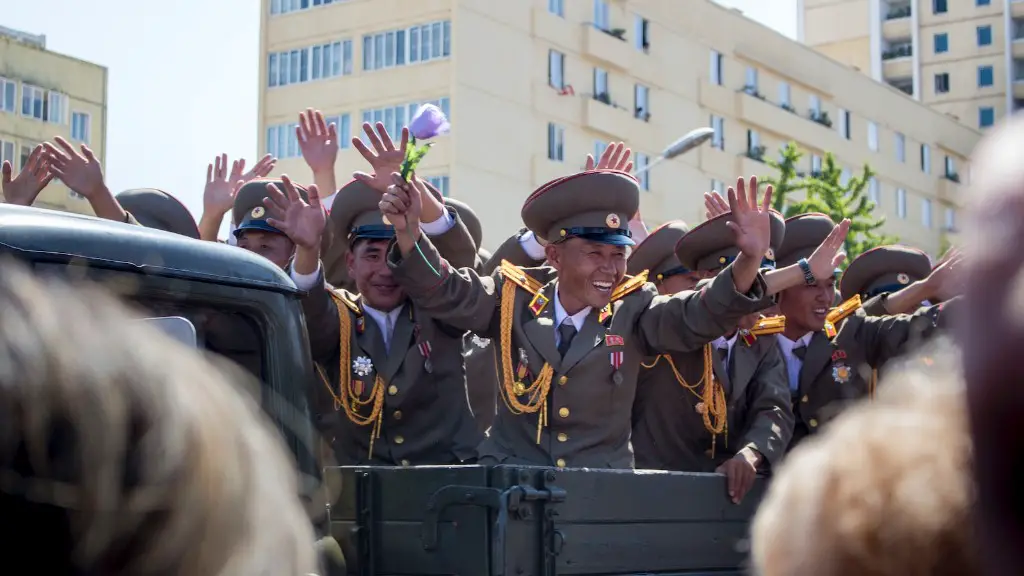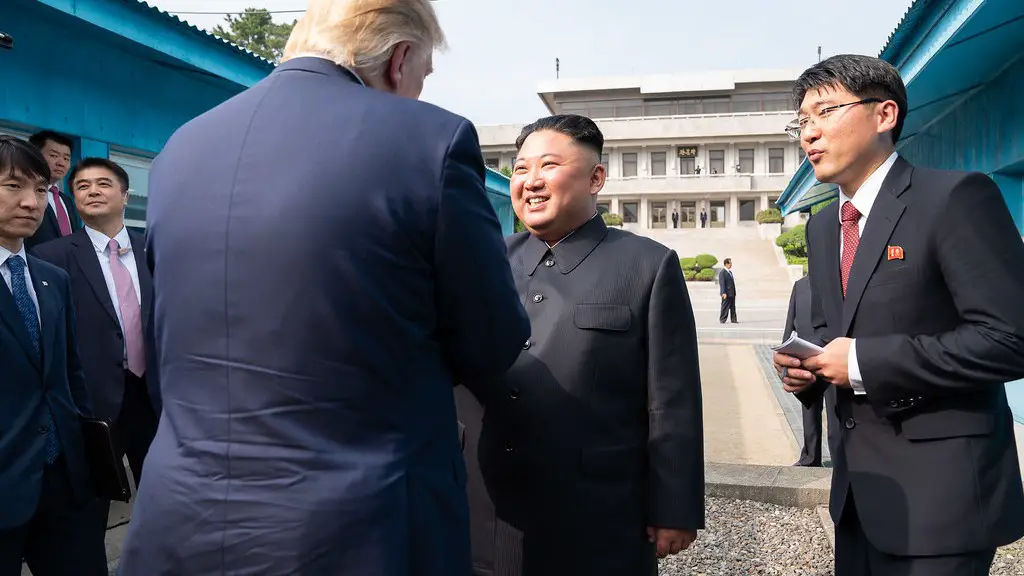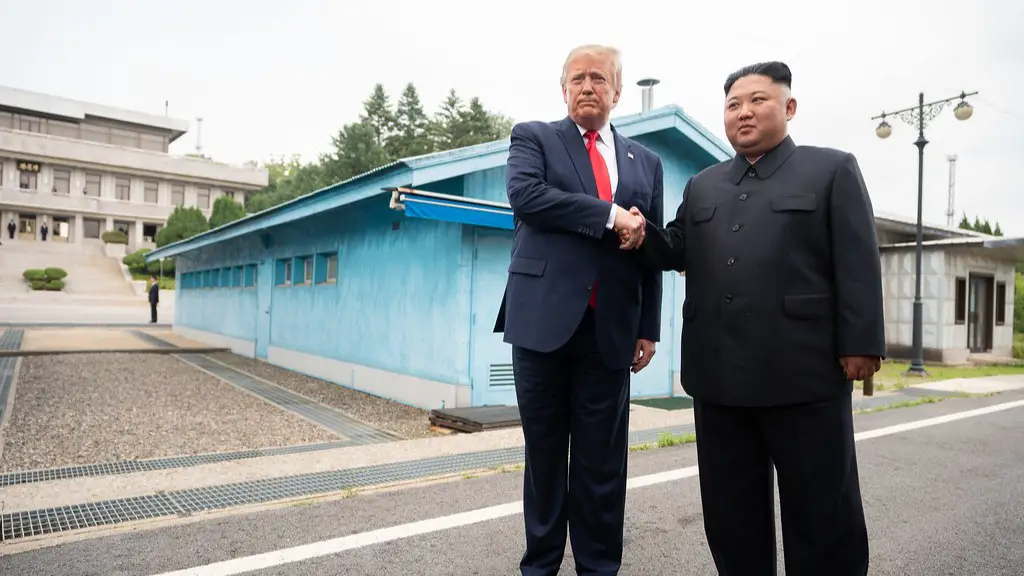For over a decade, the world has watched and worried as North Korea has built up its nuclear arsenal. Recently, the situation has been increasingly tense, leading many to ask if there is an immediate threat of a nuclear attack from the North Korean regime. In order to answer that question, it is essential to understand the dynamics of the situation and the geopolitical forces that are shaping North Korea’s decisions.
Since North Korea’s first nuclear test in 2006, it has been rapidly expanding its nuclear capacity. This expansion has been driven by leader Kim Jong-un’s aggressive pursuit of what he considers to be his nation’s rightful nuclear arsenal. North Korea has conducted six nuclear tests, the most recent being in September 2017, and it has developed missiles capable of reaching the United States.
Experts agree that North Korea possesses the capability to launch a nuclear strike. However, the likelihood that this will actually happen is debated. According to most observers, Kim Jong-un is unwilling to provoke an attack,given the certain disastrous outcome for North Korea. He has shown himself to be a master of brinkmanship, at times rattling his sabers but stopping short of an attack. He has thus managed to maintain his grip on power, while avoiding the blame for any destructive aggression.
The international community is attempting to bring North Korea to the negotiating table, but the stubbornness of both sides has so far prevented any meaningful discussion. The United States is unwilling to compromise on its long-held position against North Korea’s nuclear program, while North Korea refuses to abandon its nuclear ambitions.
At the same time, there are signs that the North Korean leadership is interested in engaging in some kind of diplomatic solution. North Korea has welcomed the recent diplomatic overtures from South Korea, and Kim Jong-un has even stated that he is willing to meet with President Trump directly. These gestures demonstrate a willingness to explore negotiations, and could potentially lead to a de-escalation of the nuclear threat.
The question of North Korea’s nuclear ambitions is a complex one, and it is impossible to predict the future. However, one thing is certain – the international community must remain vigilant in its efforts to prevent a nuclear attack from the North Korean regime.
Geopolitical Drivers
One of the key driving factors in North Korea’s pursuit of a nuclear arsenal is its unique geopolitical position. With extremely hostile neighbors to the east and west, North Korea has long used its nuclear capabilities as a deterrent to protect itself from foreign aggression. This has been reinforced by the national ideology of juche, or self-reliance, that has shaped North Korean policy for generations.
The United States is also playing a major role in the current tense situation. The US has maintained a presence in South Korea since the end of the Korean War in 1953, and has repeatedly threatened to use military force in the face of North Korean aggression. This has served to further antagonize the North Korean government, and has emboldened Kim Jong-un’s pursuit of a nuclear arsenal.
The role of China, North Korea’s neighbor and major ally, has also been an important factor in the current situation. China has made multiple attempts to reign in North Korea’s nuclear ambitions, but these have largely been unsuccessful. In recent months, China has adopted a more hardline stance against North Korea, but this may be more of an attempt to curry favor with the United States than a genuine effort to alleviate the tension.
The complex geopolitical situation has contributed to the current tensions between North Korea and the rest of the world, and is making it difficult for either side to find a resolution.
Military Action
If negotiations fail to bring an end to the nuclear standoff, many pundits worry that the only way to de-escalate the tensions with North Korea will be through military force. The US has maintained a presence in the region, and has made it clear that it is willing to use force in the face of North Korean aggression.
However, the use of military force poses a major risk. North Korea has an estimated 300 artillery pieces and long-range rockets that could potentially be used to launch a nuclear attack, and the US and its allies would be putting themselves and the Korean population in serious danger if they were to use military action.
The US has in the past employed a strategy of economic sanctions against North Korea, but these have not prevented the regime from developing its nuclear capabilities. In addition, the use of military force carries its own economic costs, and could potentially threaten the global economy.
Thus, the use of force is seen as a last resort by many, and is not a viable option in the short-term.
Domestic Factors
Domestic politics is also playing an important role in the current situation. Kim Jong-un has used his pursuit of nuclear weapons as a means of bolstering his domestic credentials and shoring up his support within the regime. He is seen as a strong leader who is willing to stand up to the United States and other foreign powers, and this has greatly endeared him to the North Korean people.
This positive perception has been reinforced by the success of recent North Korean charm offensives. These have included high-profile meetings with the South Korean president and other world leaders, as well as the release of US prisoners and the suspension of nuclear and ballistic tests. These acts of good faith have been welcomed by the international community, and have further consolidated Kim Jong-un’s position.
At the same time, North Korea is facing a severe economic crisis as a result of the international sanctions placed on it. This has led to widespread hunger and poverty, and increased the sense of desperation among the populace. This has resulted in increased support for Kim Jong-un’s hardline stance, as the North Korean people are increasingly unwilling to compromise on the issue of their nation’s nuclear arsenal.
The domestic situation in North Korea is thus a major factor in the situation, and is a reminder that the international community must take into consideration the opinions and feelings of the North Korean people when formulating any response.
Regional Threats
The fear of a nuclear attack from North Korea has had far-reaching implications, with countries throughout the region significantly increasing their military presence in preparation for an attack. South Korea has been a key target of North Korean aggression, and has deployed an array of missiles and other defense systems near the border. This has been accompanied by a massive buildup of conventional forces, as well as enhanced electronic surveillance.
Other countries in the region are also taking steps to protect themselves from a possible nuclear attack. Japan, which has borne the brunt of North Korea’s previous aggression, has significantly increased its military presence in the East China Sea. Additionally, the US has pledged to enhance its own military presence in the region, deploying an additional carrier task force and several cruises to the waters off the Korean Peninsula.
The heightened military presence is of course necessary to protect the region from a possible attack, but it also provides a powerful deterrent. The collective forces of the region have been successful in convincing Kim Jong-un not to pursue a more aggressive stance, and this has served to de-escalate the situation.
The regional threat posed by North Korea is very real, and the international community must remain vigilant in its efforts to contain and reduce the nuclear threat from the North Korean regime.
Economic Impacts
The debate over North Korea’s nuclear capabilities has also had far-reaching economic implications. The imposition of sanctions by the US and other countries has had a severe impact on North Korea’s economy, leading to a recession in recent years. This has been accompanied by a sharp decline in the value of its currency, as well as a rise in inflation.
On the other hand, the US and its allies have also come under economic pressure as a result of their aggressive stance towards North Korea. The US has imposed tariffs on Chinese imports, in an effort to persuade China to put pressure on the North Korean regime. This has had a damaging effect on US-China relations, and has led to a decline in bilateral trade.
The economic impact of the North Korean nuclear standoff has thus been far-reaching, and the situation is unlikely to be resolved in the near future. As long as the tense situation persists, the economic toll will continue to mount on both sides of the conflict.





